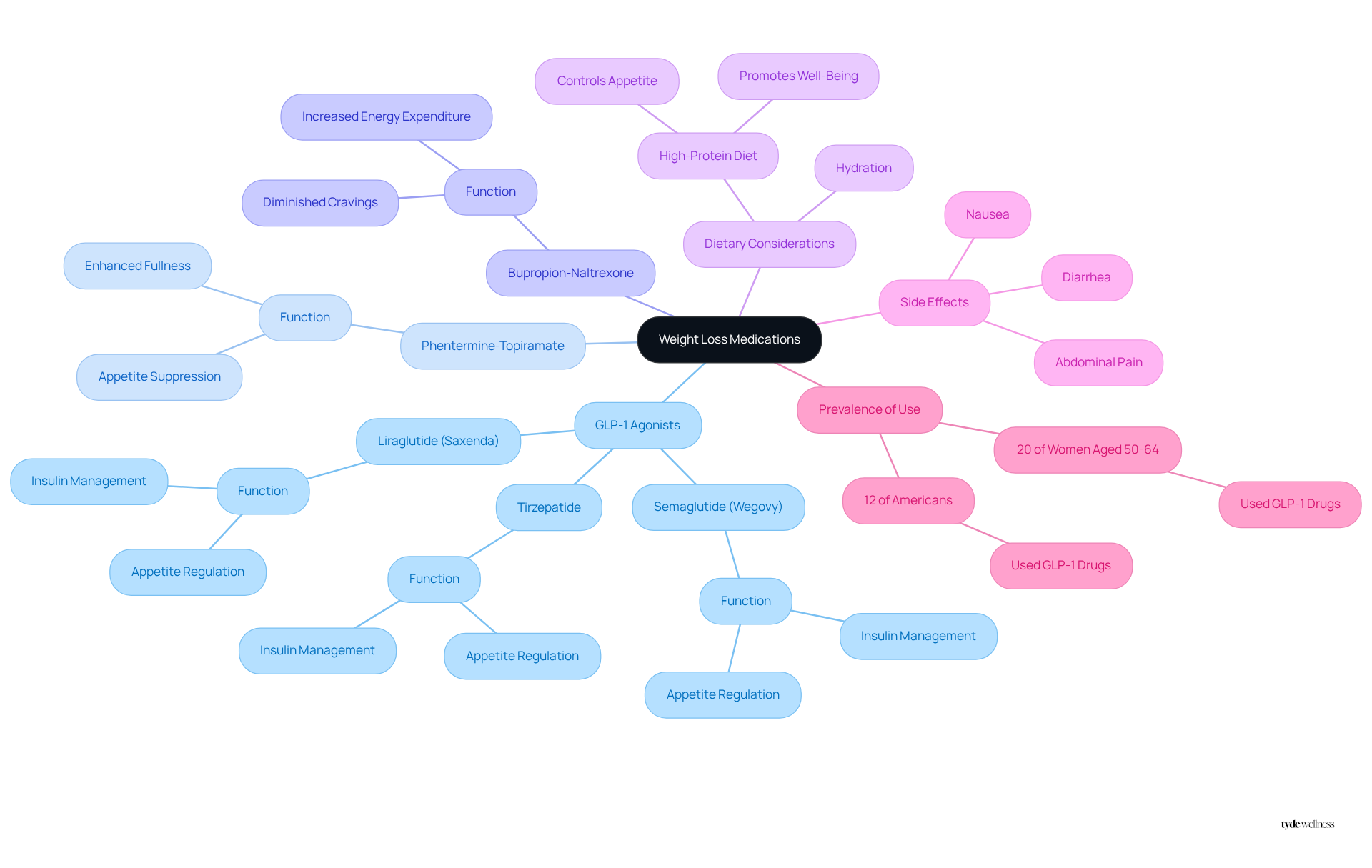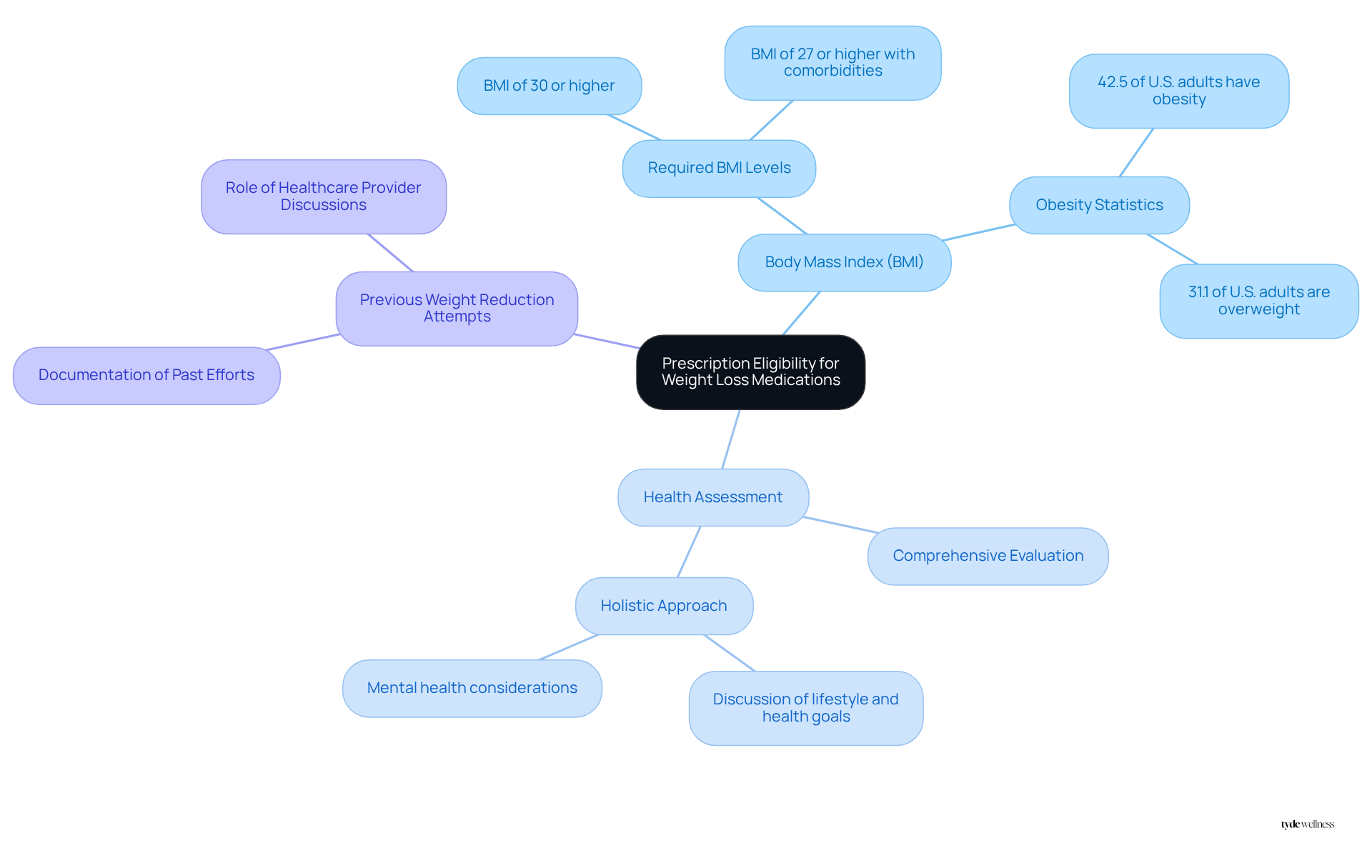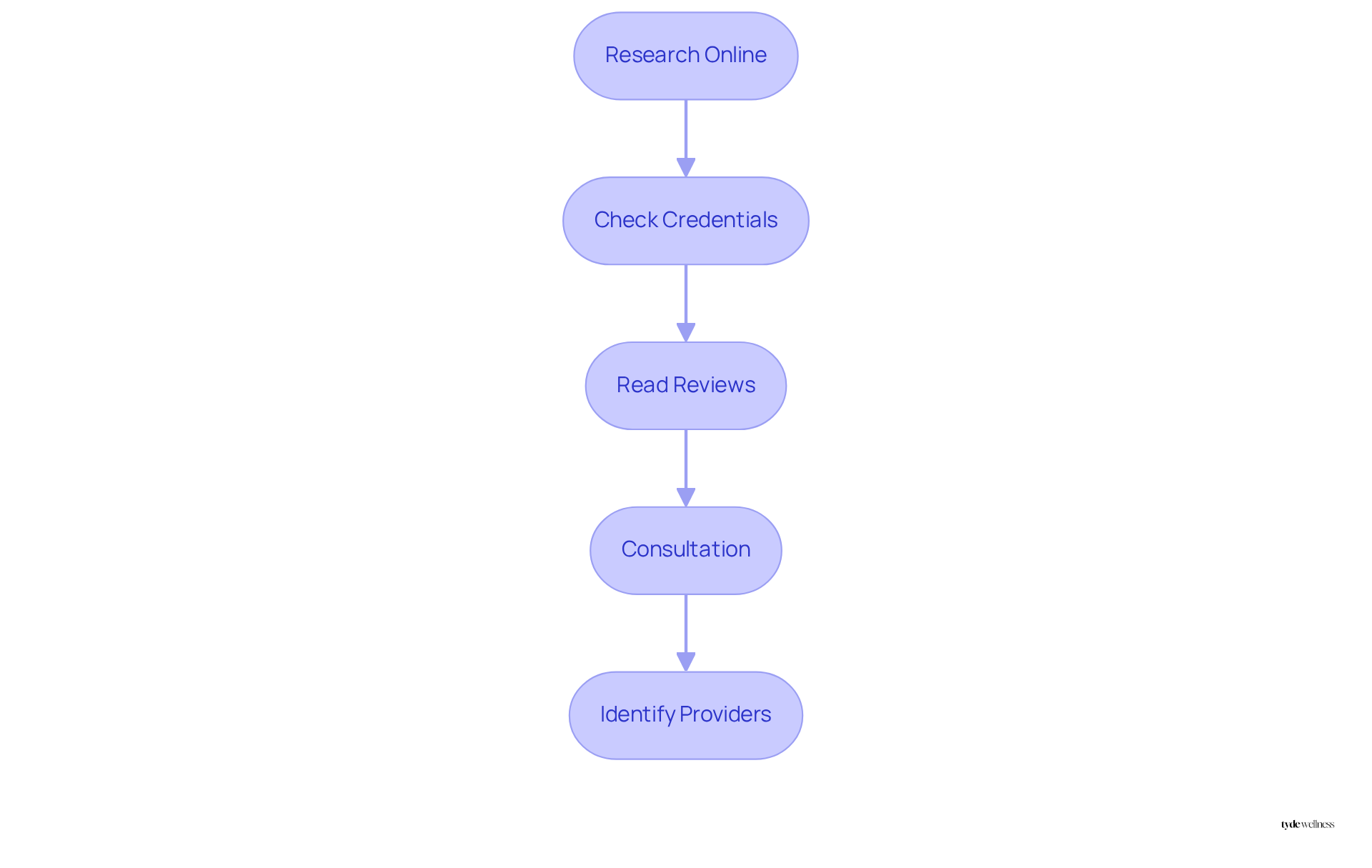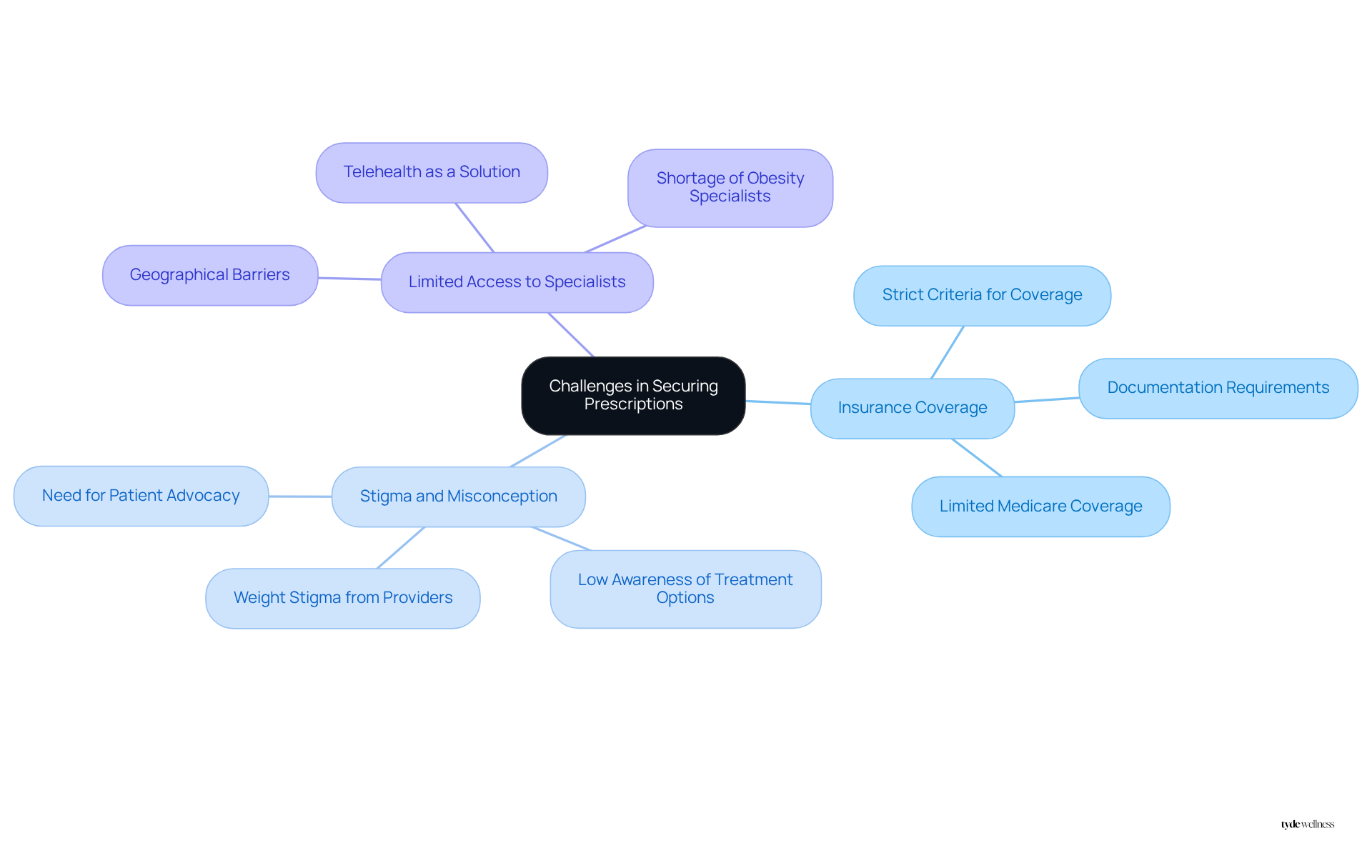Overview
To find doctors who prescribe weight loss pills for women, individuals should begin by researching certified specialists. It is essential to assess their credentials and arrange consultations to discuss personalized treatment approaches. Understanding eligibility criteria is crucial, as is recognizing the challenges that may arise, such as insurance coverage and stigma. These factors can significantly hinder access to effective weight loss medications.
Introduction
Navigating the realm of weight loss medications presents a significant challenge, particularly for women confronting the distinct hurdles posed by hormonal changes during menopause. With FDA-approved treatments such as GLP-1 agonists and combination therapies gaining prominence, it is essential to grasp their features, advantages, and the benefits they offer for those in search of effective solutions.
However, the path to securing these prescriptions is often laden with obstacles, including insurance complexities and societal stigma. Consequently, how can women effectively advocate for their health and obtain the necessary support to initiate their weight loss journey?
Understand Weight Loss Medications and Their Purpose
Weight loss treatments authorized by the FDA serve as vital resources for individuals facing obesity or excess weight concerns, particularly during menopause. Key categories include:
- GLP-1 Agonists: Medications such as Semaglutide (Wegovy), Tirzepatide, and Liraglutide (Saxenda), all available at Tyde Wellness, mimic the hormone GLP-1, which is essential for appetite regulation and insulin management. These medications have shown significant effectiveness for women undergoing hormonal changes linked to menopause, aiding in weight management during this transitional period.
- Phentermine-Topiramate: This combination treatment works by suppressing appetite and enhancing feelings of fullness, thereby facilitating adherence to dietary modifications.
- Bupropion-Naltrexone: By targeting the brain’s reward system, this treatment diminishes cravings while boosting energy expenditure, offering a comprehensive approach to weight management.
It is crucial to acknowledge that users of GLP-1 treatments, such as those prescribed at Tyde Wellness, may encounter side effects like nausea and diarrhea, which should be discussed with healthcare providers. Additionally, maintaining a high-protein diet is vital while utilizing these treatments, as it can help control appetite and promote overall well-being. Understanding the mechanisms of these medications empowers individuals to engage in informed discussions with doctors that prescribe weight loss pills regarding the most suitable options tailored to their needs. With nearly for body mass reduction, their growing prevalence underscores their importance in addressing obesity, particularly among women experiencing menopause. Tyde Wellness offers comprehensive support to ensure that each patient receives personalized care throughout their journey to a healthier lifestyle.

Identify Criteria for Prescription Eligibility
To qualify for weight loss medications at Tyde Wellness, patients must typically meet specific criteria, which include:
- Body Mass Index (BMI): Generally, a BMI of 30 or higher is required for eligibility. Alternatively, a BMI of 27 or higher may qualify if accompanied by weight-related health issues such as hypertension or diabetes. Notably, 42.5% of U.S. adults aged 20 and over have obesity, highlighting the significant number of individuals who may be eligible for these medications.
- Health Assessment: A comprehensive evaluation by a healthcare provider is essential to rule out any contraindications and assess overall health. This evaluation frequently incorporates discussions regarding past attempts to reduce mass and existing health issues. At Tyde Wellness, we emphasize a personalized approach—our initial consultation will assess your health, goals, and lifestyle to determine the best plan for you. As Dr. Wolver notes, “We talk about their sleeping habits and managing their mental health,” emphasizing the holistic nature of the assessment process.
- Previous Weight Reduction Attempts: Documentation of earlier unsuccessful efforts at reducing mass through diet and exercise is often necessary. Many patients with obesity report having attempted various methods to reduce their size, underscoring the importance of a comprehensive approach to management. Engaging in a thorough discussion with doctors that prescribe weight loss pills and your healthcare provider regarding these criteria can clarify your eligibility and outline the subsequent steps in your journey to achieve a healthier body.
At Tyde Wellness, we also encourage community engagement through our Tyde Circle members, who play a vital role in supporting women on their wellness journeys. This community element aids in dispelling false information regarding body transformation and empowers women to make knowledgeable choices. As mentioned by specialists, understanding the BMI criteria is essential, as it serves as a fundamental guideline for doctors that prescribe weight loss pills. In 2018, just 0.5% of individuals qualified for slimming treatments were utilizing them, emphasizing the significance of discussing qualifications and alternatives with healthcare professionals.

Locate and Evaluate Doctors Who Prescribe Weight Loss Pills
To find doctors who prescribe weight loss medications, consider the following steps:
- Research Online: Utilize resources such as the Obesity Medicine Association’s member directory to locate certified weight management specialists in your area. This directory ensures that you are seeking experts with .
- Check Credentials: Look for board-certified physicians in obesity medicine, endocrinology, or primary care. These providers typically complete a minimum of 60 hours of obesity-focused education and pass the American Board of Obesity Medicine certification exam, which prepares them to effectively manage body mass reduction treatments.
- Read Reviews: Patient feedback offers valuable insights into a doctor’s effectiveness and approach to health management. Researching average patient satisfaction ratings can help you assess the quality of care provided by potential specialists.
- Consultation: Arrange a preliminary meeting to discuss your weight loss goals. This meeting is crucial for evaluating the doctor’s treatment philosophy and understanding how they customize their approach to individual needs. During this consultation, inquire about their experience with weight loss treatments and their strategies for managing potential side effects.
By following these steps, you can identify healthcare providers, such as doctors that prescribe weight loss pills, who align with your health management needs and possess the expertise to navigate the complexities of obesity treatment.

Address Challenges in Securing Prescriptions
Obtaining a prescription from doctors that prescribe weight loss pills can present several challenges, particularly for women navigating complex health issues. Understanding these obstacles and implementing is essential for success in this area.
- Insurance Coverage: Many insurance plans enforce strict criteria for covering weight loss medications. Often, this includes the necessity for documentation of prior weight loss attempts or specific health conditions. It is vital to reach out to your insurance provider to clarify your plan’s requirements and gather the necessary documentation to support your case.
- Stigma and Misconception: Women often face stigma and misconceptions from healthcare providers regarding body management. Research indicates that only 3% of eligible U.S. adults receive prescriptions from doctors that prescribe weight loss pills, highlighting a significant disparity in availability. To advocate for yourself, come prepared with research and documentation of your weight loss efforts, underscoring the medical necessity of these treatments.
Limited local options can restrict access to obesity specialists, including doctors that prescribe weight loss pills, who can provide effective treatments. Telehealth services provide a practical solution, connecting you with qualified professionals remotely. This approach not only broadens your options but also allows for personalized care tailored to your specific circumstances.
By being proactive and well-informed, you can navigate these challenges and work towards securing the support necessary for your weight loss journey. Addressing these barriers is crucial, given that effective medications exist that can substantially enhance health outcomes, yet their uptake remains sluggish due to systemic issues.

Conclusion
Navigating the landscape of weight loss medications can be a transformative step for women seeking effective solutions for obesity, particularly during pivotal life changes such as menopause. This guide underscores the significance of understanding the various FDA-approved treatments, their mechanisms, and the criteria for prescription eligibility. By being informed and proactive, individuals can engage in meaningful conversations with healthcare providers to identify the best weight loss strategies tailored to their unique needs.
Key insights from the article emphasize the different categories of weight loss medications, including:
- GLP-1 agonists
- Combination therapies
These have demonstrated effectiveness in managing weight. Understanding the criteria for eligibility—such as BMI thresholds and health assessments—is crucial for those considering medication as part of their weight management journey. Furthermore, the importance of finding qualified doctors who specialize in obesity medicine cannot be overstated, as their expertise is vital in navigating the complexities of treatment and addressing potential challenges in securing prescriptions.
Ultimately, addressing the barriers to accessing weight loss medications is essential for achieving better health outcomes. By advocating for oneself, utilizing telehealth services, and being equipped with the necessary information, women can overcome the stigma and misconceptions that often accompany weight management discussions. The journey towards a healthier lifestyle encompasses not only medication but also empowerment, education, and community support. Therefore, it is imperative to seek out the right resources and professionals to guide this important process.
Frequently Asked Questions
What are FDA-approved weight loss medications?
FDA-approved weight loss medications are treatments designed to assist individuals facing obesity or excess weight concerns, especially during menopause. They include various categories that help with appetite regulation and weight management.
What are GLP-1 Agonists and how do they work?
GLP-1 Agonists, such as Semaglutide (Wegovy), Tirzepatide, and Liraglutide (Saxenda), mimic the hormone GLP-1, which is important for appetite regulation and insulin management. These medications are particularly effective for women undergoing hormonal changes during menopause.
What is the function of Phentermine-Topiramate?
Phentermine-Topiramate is a combination treatment that suppresses appetite and enhances feelings of fullness, helping individuals adhere to dietary modifications for weight loss.
How does Bupropion-Naltrexone aid in weight management?
Bupropion-Naltrexone targets the brain’s reward system to reduce cravings while increasing energy expenditure, providing a comprehensive approach to managing weight.
What side effects may occur with GLP-1 treatments?
Users of GLP-1 treatments may experience side effects such as nausea and diarrhea, which should be discussed with healthcare providers.
Why is a high-protein diet important while using weight loss medications?
A high-protein diet is vital while using weight loss medications because it helps control appetite and promotes overall well-being.
How prevalent is the use of GLP-1 medications among Americans?
Nearly 12 percent of Americans have utilized GLP-1 medications for body mass reduction, highlighting their growing importance in addressing obesity, particularly among women experiencing menopause.
What support does Tyde Wellness offer for weight loss?
Tyde Wellness provides comprehensive support to ensure that each patient receives personalized care throughout their journey to a healthier lifestyle.
List of Sources
- Understand Weight Loss Medications and Their Purpose
- Advice for trying GLP-1 drugs for weight loss from a doctor who’s been there (https://npr.org/2025/06/15/nx-s1-5432864/weight-loss-drugs-glp1-wegovy-mounjaro)
- Nearly 12 Percent of Americans Have Used GLP-1 Weight Loss Drugs; Medications Are Most Used by Women Aged 50 to 64 (https://rand.org/news/press/2025/08/nearly-12-percent-of-americans-have-used-glp-1-weight.html)
- FDA Approves New Medication for Chronic Weight Management (https://fda.gov/news-events/press-announcements/fda-approves-new-medication-chronic-weight-management)
- Identify Criteria for Prescription Eligibility
- New Prescription Weight Loss Drugs: What’s All the Hype? (https://emoryhealthcare.org/stories/wellness/new-prescription-weight-loss-drugs-whats-all-the-hype)
- What doctors should know about popular weight-loss drugs (https://aamc.org/news/what-doctors-should-know-about-popular-weight-loss-drugs)
- Weight Loss Drugs 101: Benefits and risks you need to know before picking up a prescription (https://vcuhealth.org/news/weight-loss-drugs-101-benefits-and-risks-you-need-to-know-before-picking-up-a-prescription)
- TRICARE Coverage of Weight Loss Medications: What To Know (https://newsroom.tricare.mil/News/TRICARE-News/Article/4266447/tricare-coverage-of-weight-loss-medications-what-to-know)
- Top Weight Loss Medications (https://obesitymedicine.org/blog/weight-loss-medications)
- Locate and Evaluate Doctors Who Prescribe Weight Loss Pills
- Who Can Prescribe Anti-Obesity Drugs: Get the Facts (https://healthcentral.com/condition/obesity/which-providers-prescribe-glp-1s)
- What doctors should know about popular weight-loss drugs (https://aamc.org/news/what-doctors-should-know-about-popular-weight-loss-drugs)
- Find an Obesity Doctor Near You (https://obesitymedicine.org/about/find-a-provider)
- Understanding prescription weight loss medication: How can my doctor help me lose weight? (https://ama-assn.org/delivering-care/chronic-diseases/understanding-prescription-weight-loss-medication-how-can-my-0)
- Physician discusses surge in demand for weight-loss drugs and risks in using them (https://pbs.org/newshour/show/physician-discusses-surge-in-demand-for-weight-loss-drugs-and-risks-in-using-them)
- Address Challenges in Securing Prescriptions
- US plans to test Medicare, Medicaid coverage for weight-loss drugs, Washington Post reports (https://reuters.com/business/healthcare-pharmaceuticals/us-plans-test-medicare-medicaid-coverage-weight-loss-drugs-washington-post-2025-08-01)
- New Weight Loss Drugs Raise Issues of Coverage, Cost, Access and Equity | KFF (https://kff.org/event/august-4-web-event-new-weight-loss-drugs-raise-issues-of-coverage-cost-access-and-equity)
- Why Aren’t People Who Need Weight Loss Drugs Getting Them? (https://medicine.yale.edu/news-article/why-arent-people-who-need-weight-loss-drugs-getting-them)
- Major insurance changes are coming to GLP-1 drugs for weight loss. Here’s how that could affect patients | CNN (https://cnn.com/2025/07/01/health/zepbound-wegovy-insurance-cvs-bcbs-weight-loss)
- Trump officials plan coverage for weight loss drugs under Medicare and Medicaid (https://theguardian.com/us-news/2025/aug/01/trump-weight-loss-drug-medicare-medicaid)



